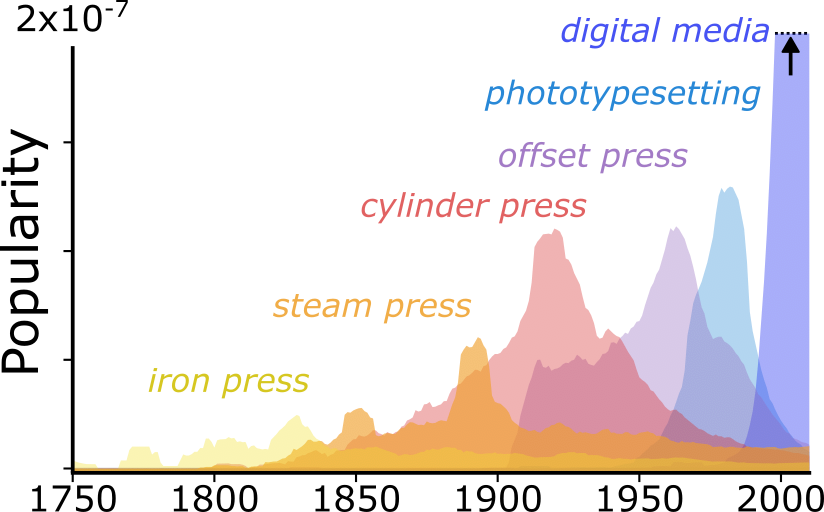Innovation doesn't stop and could increase thanks to AI
Innovation doesn't stop and could increase thanks to AI
An international team participated by the Institute of Evolutionary Biology (IBE), redefines the measure of scientific disruption and warns that Artificial Intelligence (AI) could revolutionize it in the coming years.
The study concludes that scientific disruption has increased in the last 20 years.
This research contradicts a recent study published in Nature, which claims that science is less disruptive than before.

The term "disruption" refers to a radical change in an industry or market, and in science, it is used to describe the intensity or magnitude of a paradigm shift: the extent to which old ideas are replaced by new ones.
Despite recent reports stating otherwise, a study involving the Institute of Evolutionary Biology (IBE), a joint center of the Spanish National Research Council (CSIC) and University of Pompeu Fabra (UPF), reveals that scientific disruption has increased in recent decades and could accelerate thanks to the Artificial Intelligence (AI).
The results indicate a continued growth of disruption since the year 2000, as well as a change in the dynamics of publication and work in the scientific community in recent decades.
The year 2000, coinciding with the arrival of the internet, was the most disruptive of the century
The study published in Advances in Complex Systems used a new computational model to measure the degree of disruption in scientific studies published from 1930 to 2010. The results shed light on the dynamics of scientific disruption in recent decades and indicate that new technologies increased scientific disruption in the past, with a significant increase in the 1950s.
With the advent of the internet, the research observed a considerable increase in disruption in the year 2000, which has continued to the present.
"Technology is one of the main forces of innovation," says Blai Vidiella, a researcher at IBE and co-author of the study. "From the iron printing to the arrival of digital media, new technologies generate disruption that increases with their popularity."
Artificial intelligence could revolutionize scientific disruption
In addition to being an innovative technology, the study warns that AI could accelerate scientific disruption thanks to its ability to read all digitized studies, regardless of their complexity or popularity.
Because the scientific community tends to popularize renowned studies and recognized authors, disruptive studies often go unnoticed. Now AI could "rescue" these forgotten studies, also known as "sleeping beauties."
"It is known that there are a large number of innovative and disruptive paradigms that have not seen the light of day," says Sergi Valverde, a researcher at IBE and co-author of the study.
Thanks to the potential of AI to rescue these "sleeping beauties," the dynamics of scientific disruption could be significantly altered in the coming years.
'Disruptive' science is accelerating, but the individual role of researchers is diminishing
The study also identifies new trends in the scientific community's contribution to disruption. While in the past, a single scientific article could bring about a paradigm shift, this now happens through multiple publications.
Additionally, the individual contribution of authors is diminishing, and research groups and institutions are becoming increasingly relevant.
"I don't believe in the myth of the solitary scientist; science progresses thanks to collective effort," says Sergi Valverde, a researcher at IBE and co-author of the study. "In the future, educators, students, scientists, and successful leaders will work in multidisciplinary teams, combining their expertise in fields such as computational science, human behaviour, and management."
Previous studies identified a decline in scientific disruption
The "abandonment of old ideas" that defines scientific disruption results in fewer citations or references to previous studies. However, the number of references in scientific studies has only increased in recent years, which could suggest a decrease in scientific disruption. This was argued in a study published in January 2023 in the prestigious journal Nature.
However, the research participated by IBE concludes that the increase in the number of publications has led to an exponential increase in all references, and this factor should be considered. By modifying the equation of the Nature study and applying it to the same database, the team has included these factors, and their results have been very different.
"We apply a new weighted disruption index to the model that takes these factors into account and provides a more accurate measure of the level of disruption for each study," says Salvador Duran, a researcher at IBE and co-author of the study. For this reason, the team urges a redefinition of the concept of scientific disruption and standardizing its measurement.
Reference article:
Bentley R.A, Valverde S, Borycz J, Vidiella B, Horne BD, Duran-Nebreda S, O’Brien MJ. 2023. Is disruption decreasing, or is it accelerating? Advances in Complex Systems, 26(02):1-9. DOI:10.1142/S0219525923500066
